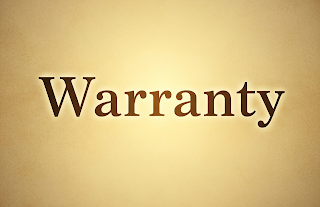⚖️ Understanding Warranties Under Trinidad and Tobago Law
Your Rights When Products Fail — Beyond the Written Warranty
In Trinidad and Tobago, many consumers are told their rights expire after a “7-day” or “30-day” warranty — especially when purchasing electronics, appliances, or furniture. But is that truly the end of your protection?
The short answer: not necessarily.
The law provides for implied protections in contracts for the sale of goods — regardless of what the written warranty says. These protections apply especially when you buy from a seller in the course of business.
Let’s explore what the Sale of Goods Act says.
🧾 What Is a Warranty, and How Is It Treated by Law?
The Act draws an important distinction between conditions and warranties:
-
A condition is a core term of the contract. If breached, the buyer may be entitled to reject the goods and treat the contract as ended.
-
A warranty is a secondary obligation. If breached, the buyer may claim damages, but usually cannot reject the goods.
Even if a term is labeled a “warranty,” courts may treat it as a condition, depending on its importance to the contract (Section 11(2)).
Once goods are accepted (in whole or part), a breach of condition may, in some cases, only entitle the buyer to a remedy for breach of warranty (Section 11(3)).
🛍️ Key Implied Rights for Consumers
1. Right to Title and Quiet Possession (Section 14)
Every buyer has an implied legal assurance that:
-
The seller has the right to sell the goods;
-
The goods are free from undisclosed charges; and
-
The buyer will have quiet possession, meaning the right to use the goods without legal interference.
2. Goods Must Match Description (Section 15)
If goods are sold by description (e.g. advertised or labeled), there is an implied condition that they will match that description.
This includes online purchases, catalog orders, and even in-store goods that are described by salespersons.
3. Merchantable Quality (Section 16(2))
If the seller is acting in the course of business, there is an implied condition that the goods are:
-
Of merchantable quality: usable, safe, and reasonably durable for their intended purpose.
-
Fit for any particular purpose made known to the seller by the buyer (Section 16(3)).
Note: This protection does not apply to defects that were:
Clearly disclosed to the buyer before sale, or
Detectable by reasonable pre-sale inspection by the buyer.
🧾 What If Goods Fail After the Express Warranty?
When a product fails after a store’s written warranty ends, buyers often assume they have no legal recourse.
But under the Sale of Goods Act, even without a written warranty, the buyer may be entitled to remedies if an implied condition or warranty has been breached.
⚖️ What Are Your Remedies?
If the issue is minor or the goods have been accepted:
-
The buyer may claim damages for breach of warranty (Section 53).
If the issue is more serious and the goods have not been accepted:
-
The buyer may be able to reject the goods and rescind the contract (Section 11, Section 15, Section 16).
How Are Damages Calculated? (Section 53)
Damages typically reflect the difference in value between:
-
What the buyer received, and
-
What the buyer should have received under the contract.
This means that even if the goods stop working after a short written warranty, the seller may still be responsible for providing compensation — if the failure amounts to a breach of the implied conditions.
🔄 Can These Rights Be Overridden?
Yes — but with limits.
The law permits contracts to modify or exclude implied terms (Section 55), but:
-
This must be done explicitly and fairly, and
-
Such exclusions may be subject to further review under the Unfair Contract Terms Act.
🧠 Practical Advice for Consumers
Before buying, ask:
-
Does the product come with a warranty in writing?
-
Will the product likely last beyond the stated warranty?
-
Are there defects disclosed before the sale?
-
Is the seller acting in the course of business?
And if something goes wrong:
-
Do not assume you're without options because a “30-day warranty” expired.
-
Review the product description, your receipt, and the implied protections under the Sale of Goods Act.
-
If the seller refuses to help, you may still have legal grounds to seek compensation — or, in certain cases, to reject the product.
While many local businesses offer short written warranties (like 7–30 days), international standards provide much stronger and longer protections.
Here’s a global comparison:
Consumer Rights and Warranties by Country/Region
🛡️ CAIR’s Role
At CAIR, we are committed to educating and empowering consumers in Trinidad and Tobago. Our aim is to:
-
Promote awareness of consumer rights under existing legislation,
-
Support fair and lawful business practices, and
-
Encourage resolution between consumers and businesses based on shared understanding of the law.
We believe in balance, fairness, and transparency — for consumers and businesses alike.
📞 Need help understanding your consumer rights?
📧 Contact us: consumer.advocacy.united@gmail.com
🌐 Visit: https://sites.google.com/view/cairtt/home?authuser=3


.jpg)




No comments:
Post a Comment